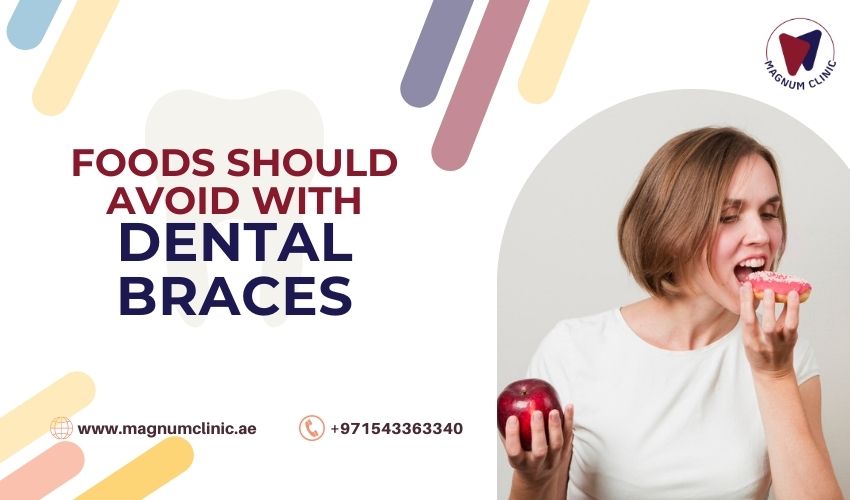What Foods Should You Avoid with Dental Braces? Orthodontic Diet Tips

Your orthodontist usually recommends Braces to align or straighten your teeth or in the presence of gaps between the teeth. The hardest part of getting orthodontic treatment is giving up some of the foods you love. There are certain foods should avoid with dental braces, as they may get stuck to the braces and cause damage to them, leading to delayed orthodontic treatment.
Learn more about orthodontic treatment and the food restrictions with braces. Foods should avoid with dental braces are hard and sticky food, read on to find out more about it
What is orthodontic treatment?
Orthodontic treatment is a dental procedure used to realign or straighten misaligned teeth and enhance smiles. By spreading biting pressure uniformly across all of the teeth, orthodontic treatment not only helps to improve a person's appearance but also helps to maintain long-term dental health.
Foods to avoid with braces
Braces are sensitive to damage; therefore, avoid hard and sticky foods that may damage the braces.Foods that you should avoid with braces are:
- Hard foods and braces:
Avoid eating hard foods with braces since they can damage the braces. Examples include hard candy, hard meat, and hard fruits and vegetables like apples and carrots. They can be eaten by slicing them into smaller pieces, if necessary.
- Sticky foods and braces:
Sticky foods like toffee, caramel, and chewing gum are to be avoided with braces as they get easily stuck to them, leading to their breakage.
- Acidic foods and braces:
Acidic foods like juices, sodas, and citrus fruits like oranges, lemons, and grapefruits are to be avoided with braces. These acidic foods can weaken the enamel, increasing the risk of tooth decay.
- Popcorn and braces:
Popcorn is to be avoided with braces as the hard, unpopped kernels can cause breakage of the braces, and the thin husks get stuck to the braces and cause damage.
- Sugary foods and braces:
It is important to avoid sugary foods like candies, cookies, cakes, and sweet beverages as they contribute to plaque buildup, especially around the braces, and increase the risk of tooth decay.
- Carbonated drinks and braces:
Carbonated drinks have a high sugar content, which increases the risk of tooth decay. It is advisable to avoid these carbonated drinks and opt for healthier options like water or herbal tea.
What can you eat during your orthodontic treatment with braces?
Ideal foods to eat with braces include:
- Yoghurt
- Soups
- Mashed potatoes
- Scrambled eggs
- Sea food
- Soft fruits and vegetables
- Grains
- Soft cheeses
- Moist desserts
- Pasta
Basically, anything that is easy to chew can be taken with braces.
Read Also: Different Types of Braces
Conclusion
Though orthodontic treatment helps improve your smile by straightening the teeth, if proper maintenance measures are not taken, the risk of damaging the braces increases, leading to a delay in the treatment. It is important to be careful about the food you eat to avoid any damage to the braces.
Visit the Magnum Clinic to learn more about Dental implants. Contact us today!
FAQs (Frequently Asked Questions)
Can hard foods or chewing gum be eaten with braces?
It is highly recommended to completely avoid hard foods like hard candy, hard meat, or nuts with braces. They get easily stuck to the braces and can damage them.
Can I eat vegetables and fruits with braces?
Yes, fruits and vegetables can be taken with braces, but preferably the softer ones. Hard ones can be cut into small, manageable pieces. Avoid biting directly into hard vegetables and fruits, like carrots and apples, with braces.
What are the foods I should be cautious about during my orthodontic treatment?
Hard, sticky foods like toffee, caramel, chewing gum, or sticky candies should be avoided as they get stuck to braces and damage them.
Can I have bagels, bread, or pizza with braces?
Be very cautious while having bread or pizza with braces; you consume it by tearing the bread or pizza crust into small pieces before eating.
